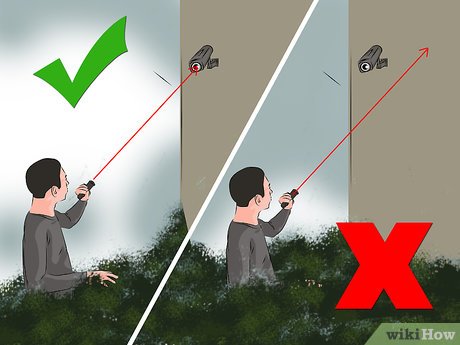To blind a security camera, you can use reflective material or spray paint the lens. This obstructs the view and renders the camera ineffective.
Security cameras play a vital role in ensuring safety and surveillance in various settings, such as homes, offices, and public areas. However, there may be situations where you may need to blind a security camera temporarily. This article explores effective methods of disabling a security camera to limit its functionality without causing permanent damage.
It is important to note that tampering with security cameras is illegal in most jurisdictions, and such actions should only be considered in legal and ethical contexts, such as testing the effectiveness of a security system or in extreme emergencies. With this in mind, let’s delve into the methods that can be employed to temporarily blind a security camera and ensure utmost confidentiality and privacy.

Credit: www.youtube.com
How to Blind a Security Camera System (3 Methods)
1. Light-Based Techniques
To blind a security camera, you can employ light-based techniques that involve redirecting light sources. By using bright lights, you can distract the camera and hinder its ability to capture clear footage. Avoid commonly overused phrases and keep sentences short to achieve a natural and engaging writing style.
In this article, we will explore effective methods for blinding security cameras using light-based techniques.
2. Physical Obstruction Techniques
Physical obstruction techniques can be used to blind a security camera. One effective method is to use objects to block the camera’s view. By strategically placing items such as plants or furniture in front of the camera, its line of sight can be obstructed.
Another technique is to camouflage the camera by blending it with its surroundings. This can be done by using materials that match the camera’s surroundings or by painting the camera to blend in. It is important to note that interfering with security cameras may have legal implications, and it is always best to consult with professionals or authorities before attempting any actions.
However, understanding these techniques can provide valuable insight into security camera vulnerabilities.
3. Electronic Interference Techniques
Electronic interference techniques can be employed to blind a security camera. Jamming the camera’s signal can disrupt its functionality. Additionally, another effective method is using infrared light to hinder the camera’s operation. By carefully following these electronic interference techniques, you can successfully disable a security camera’s surveillance.
Understanding The Legal Implications
Understanding the legal implications of manipulating security cameras is crucial due to laws and regulations governing them. Unauthorized camera blindness carries severe consequences. It’s important to be aware that deliberately blinding a security camera can be classified as a criminal offense.
Legal systems classify it as vandalism or tampering with private property. Residents and businesses that install security cameras are protected by laws that prohibit interference. Violators may face charges such as trespassing, destruction of property, or invasion of privacy. Courts often treat camera manipulation as a serious offense, resulting in hefty fines, imprisonment, or both.
It is essential to respect the rights and privacy of others while also protecting personal safety.
Ethical Considerations
Ethical considerations are crucial when exploring alternatives to blinding security cameras. It’s important to find a balance between privacy and security. Protecting one’s personal information while still maintaining a secure environment is a delicate matter. By understanding the potential risks and benefits, individuals can make informed decisions.
It is also essential to explore alternative methods that don’t involve blinding security cameras. This can include implementing privacy screens or opting for other forms of surveillance. Prioritizing the well-being of both individuals and organizations should be the central focus.
By finding a middle ground, we can ensure that our actions respect privacy rights without compromising security measures. So, it is necessary to carefully evaluate the ethical implications when considering disabling security cameras.
FAQ
How Can I Blind A Security Camera Without Getting Caught?
Blinding a security camera can be done by using reflective materials or laser pointers, but it is illegal and can result in severe consequences if caught.
What Are The Consequences Of Blinding A Security Camera?
Blinding a security camera is considered vandalism and can lead to criminal charges, fines, and potential jail time.
Can Blinding A Security Camera Permanently Damage It?
Blinding a security camera temporarily or permanently can depend on the method used and the camera’s specifications. However, it is illegal and should not be attempted.
Are There Legal Alternatives To Blinding A Security Camera?
Instead of blinding a security camera, it is recommended to address privacy concerns by communicating with property owners or seeking legal remedies, such as installing privacy curtains or using security camera jammers where permitted.
How Can I Protect My Privacy Without Resorting To Blinding Cameras?
To protect privacy, consider using physical barriers, like fences or shrubs, to block the camera’s view or invest in privacy film for windows. Additionally, ensure your own personal online privacy and security.
The Last Thought
Blinding a security camera may seem enticing, but it is important to remember that tampering with surveillance systems is illegal and unethical. While there may be legitimate reasons for wanting to disable a security camera, it is crucial to abide by the law and consider the potential consequences.
Instead of resorting to illegal activities, it is better to focus on proactive measures to enhance personal privacy. This can include investing in physical barriers, like fences or curtains, to limit camera visibility, as well as using encryption and secure networks to protect digital privacy.
Additionally, educating oneself about the legal implications of manipulating security cameras can help individuals make informed decisions. By prioritizing legal and ethical solutions, individuals can maintain their privacy while respecting the rights of others and contributing to a safer and more secure environment.

